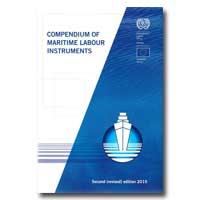제품상세보기

The Maritime Labour Convention, 2006, adopted by the International Labour Conference at its 94th (Maritime) Session, is sometimes called a “bill of rights” for seafarers. It sets out seafarers’ rights to decent conditions of work and helps establish conditions for fair competition for shipowners.
The Maritime Labour Convention, 2006, has become the “fourth pillar” of the international regulatory regime for quality shipping, complementing the key Conventions of the International Maritime Organization (IMO). The 2014 amendments to the Convention are included in this edition.
The Convention contains a comprehensive set of global standards, consolidating almost all the existing maritime labour Conventions and Recommendations that have been adopted since 1920 in a single new Convention reflects modern conditions in the industry. The Convention establishes international requirements for decent work for all seafarers, including minimum terms in seafarers’ employment agreements, minimum age, medical fitness requirements, training, wages, leave, repatriation, on-board accommodation and catering, medical care, occupational safety and health, welfare and social security. An important new part of the Convention, Title 5, is devoted to compliance and enforcement requirements. These requirements were designed to achieve continuous compliance awareness at every stage, taking into account national as well as international systems of protection and including inspection of conditions on all ships as well as flag State certification, and port State inspection, of labour conditions on ships that go on international voyages.
This essential new reference also includes the Seafarers’ Identity Documents (Revised) Convention, 2003 (No. 185), the Work in Fishing Convention, 2007 (No. 188) and Recommendation, 2007 (No. 199), the ILO’s fundamental Conventions and the ILO Declaration on Fundamental Principles and Rights at Work and its Follow-up. To help with implementation, this revised second edition includes the 2015 edition of Frequently Asked Questions (FAQ).




